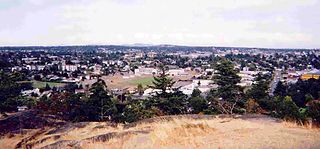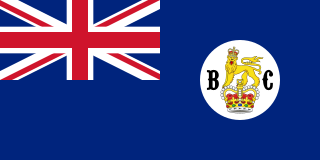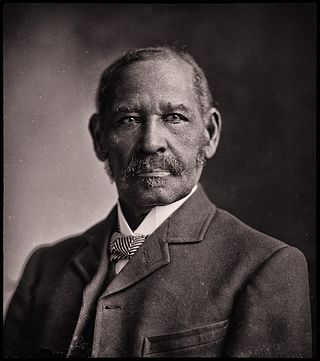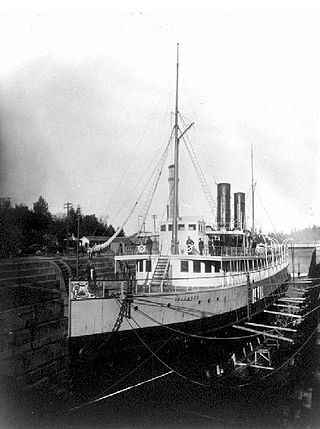Related Research Articles

Amor De Cosmos was a Canadian journalist, publisher and politician. He served as the second premier of British Columbia.

The Township of Esquimalt is a municipality at the southern tip of Vancouver Island, in British Columbia, Canada. It is bordered to the east by the provincial capital, Victoria, to the south by the Strait of Juan de Fuca, to the west by Esquimalt Harbour and Royal Roads, to the northwest by the New Songhees 1A Indian reserve and the town of View Royal, and to the north by a narrow inlet of water called the Gorge, across which is the district municipality of Saanich. It is almost tangential to Esquimalt 1 Indian Reserve near Admirals Road. It is one of the 13 municipalities of Greater Victoria and part of the Capital Regional District.

John Robson was a Canadian journalist and politician, who served as the ninth premier of British Columbia.
The 1871 British Columbia general election was held from October to December 1871. Formerly a British colony, British Columbia became a province of Canada on July 20, 1871. An interim Cabinet was appointed by the lieutenant governor of British Columbia and election writs for the first general election as a province of Canada were issued to choose 25 members of the first provincial legislature from 12 ridings. These ridings were:
Victoria District was a federal electoral district in British Columbia, Canada, that was represented in the House of Commons of Canada from 1871 to 1872.
The 1875 British Columbia general election was held in 1875. Many of the politicians in the House had served with the Legislative Council or Assembly or the Executive Council, or had otherwise been stalwarts of the colonial era - some supporters of Confederation, others not. Some were ranchers or mining bosses from the Interior, others were colonial gentry from the Island and New Westminster, and others direct arrivals from Britain, Ireland or "Canada", which was still considered a different place not only in the minds of the politicians but in the language used in Hansard during this period.
The 1878 British Columbia general election was held in 1878.
The 6th Parliament of the Province of Canada was summoned in January 1858, following the general election for the Legislative Assembly in December 1857. Sessions were held in Toronto in 1858 and then in Quebec City from 1859. The Parliament was dissolved in May 1861.

The Colony of Vancouver Island, officially known as the Island of Vancouver and its Dependencies, was a Crown colony of British North America from 1849 to 1866, after which it was united with the mainland to form the Colony of British Columbia. The united colony joined Canadian Confederation, thus becoming part of Canada, in 1871. The colony comprised Vancouver Island and the Gulf Islands of the Strait of Georgia.

The Colony of British Columbia was a British Crown Colony that resulted from the 1866 merger of two British colonies, the Colony of Vancouver Island and the mainland Colony of British Columbia. The united colony existed until its incorporation into Canadian Confederation in 1871 as the Province of British Columbia.

Mifflin Wistar Gibbs was an American-born Canadian politician, businessman, newspaper publisher, and advocate for black rights. He moved to California as a young man, during the Gold Rush, and was an early black pioneer in San Francisco. Gibbs published the first black newspaper in California and was an active leader in the early California State Convention of Colored Citizens.

Esquimalt Royal Naval Dockyard was a major British Royal Navy yard on Canada's Pacific coast from 1842 to 1905, subsequently operated by the Canadian government as HMC Dockyard Esquimalt, now part of CFB Esquimalt, to the present day.

Sir Henry Pering Pellew Crease was a British-Canadian lawyer, judge, and politician, influential in the colonies of Vancouver Island and British Columbia. He was the first Attorney General of the united Colony of British Columbia, and sat on the Supreme Court of that province for 26 years.

The Legislative Assembly of Vancouver Island, sometimes House of Assembly of Vancouver Island, was the colonial parliamentary body that was elected to represent voters in the Colony of Vancouver Island. It was created in 1856 after a series of petitions were sent to the Colonial Office in London protesting the Hudson's Bay Company's proprietary rule over the colony. It was the first elected assembly in British North America west of Ontario. Although at first only handful of colonists met the voting requirement, and most of those that did were tied to the HBC, the franchise was gradually extended, and the assembly began to assert demands for more control over colonial affairs, as well as criticize colonial governor Sir James Douglas's inherent conflict of interest as both governor and Hudson Bay Company's chief factor.

Victoria Harbour is a harbour, seaport, and seaplane airport in the Canadian city of Victoria, British Columbia. It serves as a cruise ship and ferry destination for tourists and visitors to the city and Vancouver Island. It is both a port of entry and an airport of entry for general aviation. Historically it was a shipbuilding and commercial fishing centre. While the Inner Harbour is fully within the City of Victoria, separating the city's downtown on its east side from the Victoria West neighbourhood, the Upper Harbour serves as the boundary between the City of Victoria and the district municipality of Esquimalt. The inner reaches are also bordered by the district of Saanich and the town of View Royal. Victoria is a federal "public harbour" as defined by Transport Canada. Several port facilities in the harbour are overseen and developed by the Greater Victoria Harbour Authority, however the harbour master's position is with Transport Canada.

The 1860 New York state election was held on November 6, 1860, to elect the governor, the lieutenant governor, a Canal Commissioner, and an Inspector of State Prisons, as well as all members of the New York State Assembly. Besides, the question of Negro suffrage was asked, and was answered in the negative with 197,503 votes for and 337,984 against it.
John Ash was a Canadian physician and politician.
A total of 15 members were elected to the Third House of Assembly of Vancouver Island which ruled from September 2, 1863, to August 31, 1866. This was the last parliament for an independent Colony of Vancouver Island before unification with the colony of British Columbia.
This is a list of elections in Canada scheduled to be held in 2020. Included are municipal, provincial and federal elections, by-elections on any level, referendums and party leadership races at any level. In bold are provincewide or federal elections and party leadership races.
References
- ↑ "Archived copy". Archived from the original on 2013-05-21. Retrieved 2012-05-08.
{{cite web}}: CS1 maint: archived copy as title (link) - ↑ British Colonist [ permanent dead link ], 10 January 1860
- ↑ British Colonist [ permanent dead link ], 10 January 1860
- ↑ http://www.britishcolonist.ca/tc/1860/01/14/18600114002.pdf%5B%5D
- ↑ http://www.britishcolonist.ca/tc/1860/01/12/18600112002.pdf%5B%5D
- ↑ Top of column 4 http://www.britishcolonist.ca/tc/1860/01/10/18600110002.pdf%5B%5D
- ↑ [ permanent dead link ]
- ↑ Column 1 http://www.britishcolonist.ca/tc/1860/01/14/18600114002.pdf%5B%5D